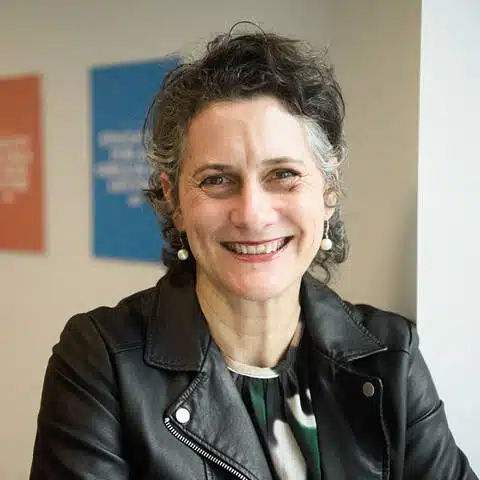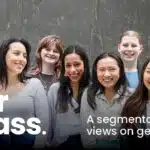Media Centre - Opinion Piece - 19 September 2023
Are we equal? It depends on who you ask

By Susanne Legena, Plan International Australia CEO. This opinion piece was originally published on September 18, 2023 in the Canberra Times
As the CEO of a humanitarian organisation dedicated to advancing girls’ rights all around the world, I couldn’t have been more excited to watch Matildas mania take hold of Australia.
“Really?” I found myself thinking, as I watched the tv footage roll in: thousands of men stomping and cheering everywhere from the SCG to neighbourhood pubs, their eyes fixed on the big screen as Raso and her hair ribbon bounded effortlessly across the field.
“Were we really getting this response, from the Australian public?”
Yes. We were.
Much has already been said in these pages and others about the historic moment we all witnessed last month in the Women’s World Cup. I won’t add my voice to that particular chorus, for now – it’s already beautiful enough.
What I have been reflecting on, though, after 12 years working with girls’ rights charity Plan International Australia – is what myself and others can learn about gender equality from this experience, and how to advance it. When and how change happens. And how complicated attitudes towards gender really are.I’ll admit it now: I think we can do it better.
Aided by a ground-breaking piece of research my organisation has just released, Gender Compass, I’ve come to realise that for too long, we have been talking to the people who already agree with us.
Gender Compass is a first-of-its-kind piece of research (developed from an extensive survey of 2,500 Australians) which segments the public into six groups according to their beliefs, policy preferences and behaviours around gender equality.
The World Economic Forum calculates that we are still 131 years away from achieving gender equality. This means that, based on average predicted lifespans, a girl born in 2062 still won’t see gender equality achieved in her lifetime.
This is unacceptable. We must beat this ticking clock and accelerate change. If not, we risk locking out billions of girls around the world from participating fully and richly in life, and the benefit of their contributions.
What did the survey reveal? On the plus side, it showed broad community support for a gender equal society, with almost universal recognition (90%) of the importance of Australian women having the same rights, opportunities and outcomes as men.
But what it also revealed is the sheer amount of confusion, ambivalence and disagreement there is in Australian society about what exactly constitutes gender equality (or inequality); how far we are from achieving it, what degree of change is needed, what actions must be taken, and by who.
Interestingly the majority of Australians believe we are very close to achieving gender equality, if not already there. However, in a country where violence against women continues at alarming rates and women still take home an annual salary $25,596 lower than their male counterparts, this couldn’t be further from the truth. Worldwide, we’re seeing the shocking roll back of women and girls’ rights – in Afghanistan girls and young women can’t attend school or university, in the US access to abortion has been curtailed and almost a year ago Mahsa Amini was murdered in Iran for not ‘covering her hair properly’ and wearing ‘tight jeans.’
We named the group we’ve predominantly been speaking to ‘the Trailblazers’. This group generally skews younger, and more female. They’re educated, they’re deeply conscious of the way their gender has impacted their lives and strongly support measures to address inequality. They represent 19% of Australian society. They are an important segment to engage with and they make me feel optimistic.
But are they majority of Australian society? No. Are they necessarily in positions of influence or power? No and no. Is it fair to expect them to shoulder the whole burden? No. Yet for far too long, most gender equality advocates have been speaking – not exclusively, but almost – to this group. There’s a remaining 81% out there. Our tool segments them into five other groups, and reveals how different they are.
Contrasting with – but with some similarities to – the Trailblazers, are the “Conflicted” group, who make up 12% of Australians. Like the Trailblazers, they are younger, they are educated, and they are mostly cisgender. Unlike the Trailblazers, they skew male. Yet when it comes to their views and level of awareness of gender equality, these groups seem to diverge. While we gave the Trailblazers an ‘awareness score’ (after testing them about facts on gender inequality) of 79; the Conflicted scored 4. While only 6% of Trailblazers believe we are close to achieving gender equality, 32% of the Conflicted think we’re nearly there.
Yet, when we break through to this group of people, it can have extraordinary results. In Somalia and Mali, Plan International works alongside fathers and male care-givers so that they share childcare responsibilities and domestic chores. We support them to understand the importance of providing equal opportunities for girls and boys. Many of these fathers now advocate for gender equality within their own communities; some are now actively campaigning to outlaw harmful practices such as female genital mutilation
We need to be engaging with the conflicted – and other segments – here in Australia, too.
Where Gender Compass is especially helpful is in its attention to demography and to participants’ values and feelings. The biggest ‘feeling’ about gender equality among the Conflicted group was hope. Whereas for Trailblazers it’s frustration, for Rejectors – another segment in our tool – it’s indifferent.
For the first time in my career as an advocate, we are really seeking to understand what people believe on gender, and why. This research couldn’t have come at a better time, with the Federal Government due to release its National Strategy to Achieve Gender Equality any day now.
As the saying goes, ‘When we all do well, we all do well.’ Gender equality is fundamentally about loosening the shackles of patriarchy and the damage it causes to everyone – including and even especially to men.
Let’s not wait another 131 years to see gender equality become a reality.
Media contacts


